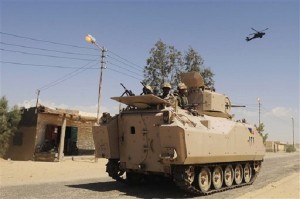
In this Associated Press file photo, Egyptian Army soldiers patrol in an armored vehicle backed by a helicopter gunship during a sweep through villages in Sheikh Zuweyid, northern Sinai, Egypt. AP
CAIRO — An Egyptian military court convicted an award-winning journalist Saturday of endangering national security by spreading false information in his coverage of operations against Islamic militants in the Sinai Peninsula, and handed him a six-month suspended sentence on Saturday, a security official and a lawyer said.
The case against Ahmed Abu-Draa, who was arrested on Sept. 4, has drawn outrage from fellow journalists and rights groups accusing the army of undermining freedom of expression and continuing to refer civilians to military tribunals, despite a campaign to stop the practice.
Colleagues said Abu-Draa’s trial was an attempt to silence independent reporting from the flashpoint area, which sits on the border with Israel and the Gaza Strip. Few journalists have direct access to what is happening in Sinai because of security concerns, forcing many to rely on statement by officials.
In addition to the suspended sentence, the journalist was fined $30 for entering a military zone without a permit. The court dropped charges of broadcasting news that undermine Egypt’s reputation abroad, and filming strategic areas without a permit, according to his lawyer, Negad El-Borai.
El-Borai said Abu-Draa, 38, had been held in solitary confinement in a military prison. The lawyer called the suspended sentence an attempt to defuse criticism, while still delivering a warning that people should not challenge the military.
He said that was the wrong message. “There is no case. He should have been set free,” el-Borai said.
Abu-Draa had disputed the military’s claims that no civilians were hit in an intensified operation against rising militant attacks in the Sinai. The military said it was only targeting homes of militants and tunnels used for smuggling goods to Gaza, but the journalist reported that civilian homes were hit and a mosque was damaged.
Amnesty International also criticized the prosecution of Abu-Draa, saying he was “being prosecuted for challenging the army’s version of its operations in the restive North Sinai region.”
A security official said an intelligence report presented to the court had stated that Abu-Draa had acted with “good intentions.” The official spoke on condition of anonymity because he was not authorized to speak to the media.
Abu Draa, who lives in Sinai, freelances for multiple Egyptian and foreign newspapers and television channels.
It was unclear when Abu-Draa would be released. The suspension runs for three years, meaning that if he commits another offense in this period, he would be punished for both.
Activists and lawyers have campaigned to end military trials for civilians as discussions for amending Egypt’s constitution, which was passed under the now-ousted Islamist President Mohammed Morsi, are underway.
Ahmed Maher, a leading member of youth group April 6, said such tribunals for civilians should be banned from the amended constitution.
“Imprisoning journalists was one of the mean reasons of revolting against (ousted President Hosni Mubarak) and Morsi. Agreeing to their jailing and even trying them before military tribunals is treason to the revolution,” Maher wrote on his Twitter account.